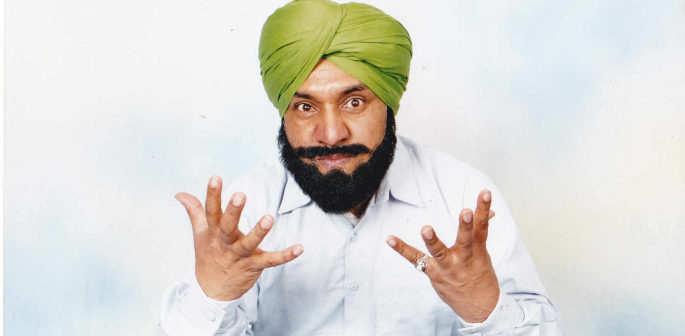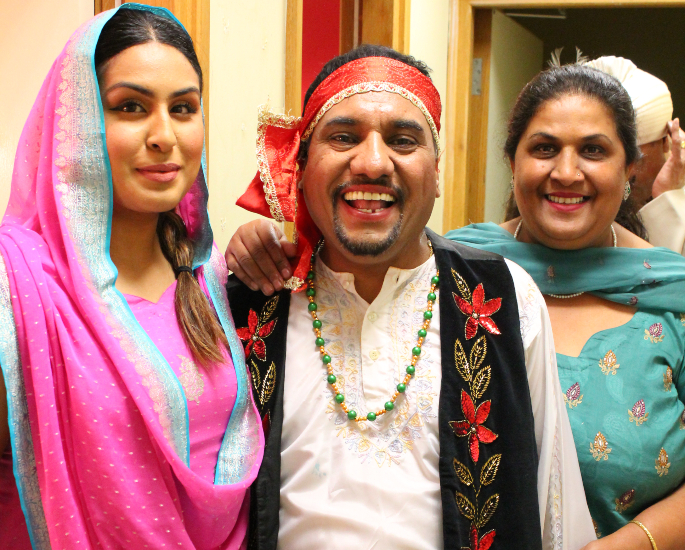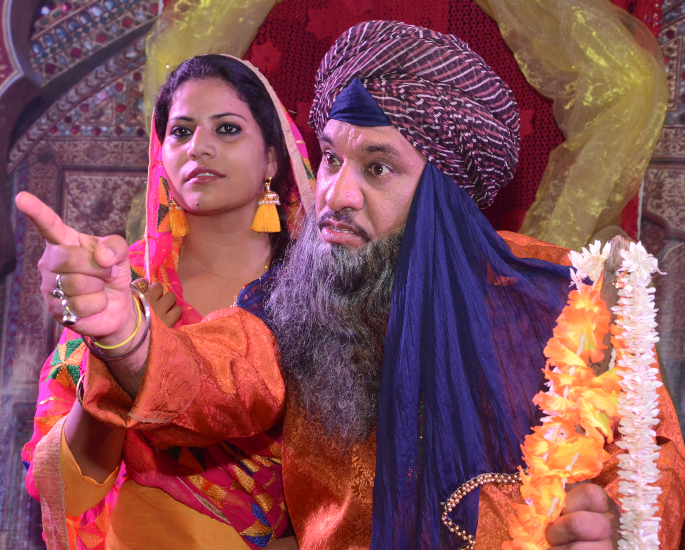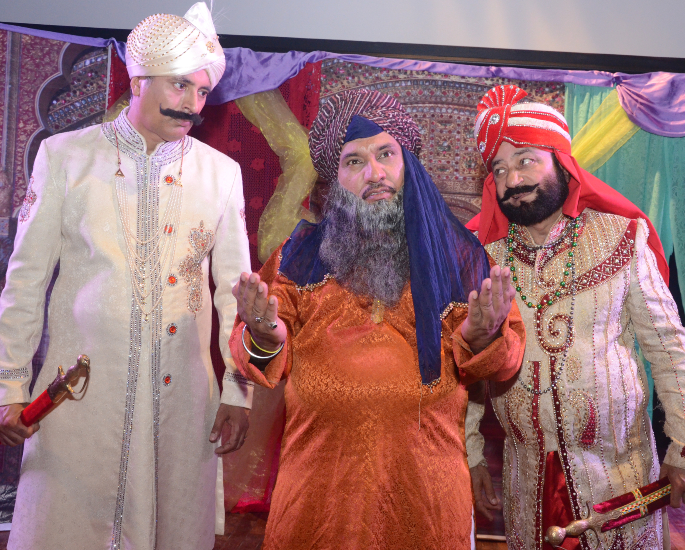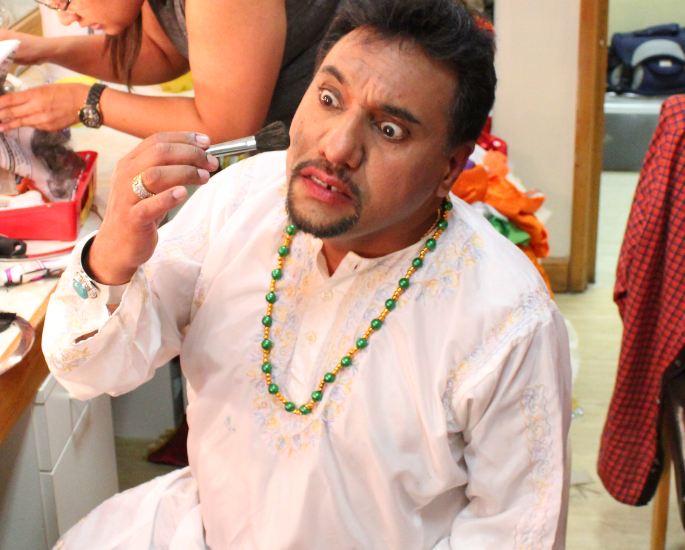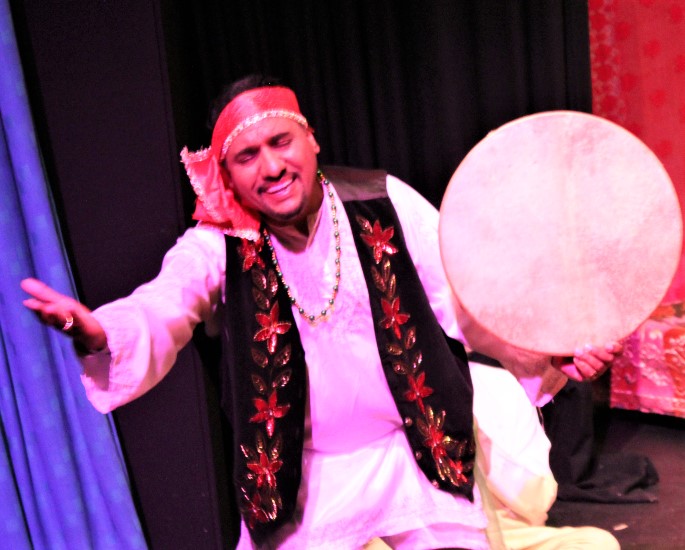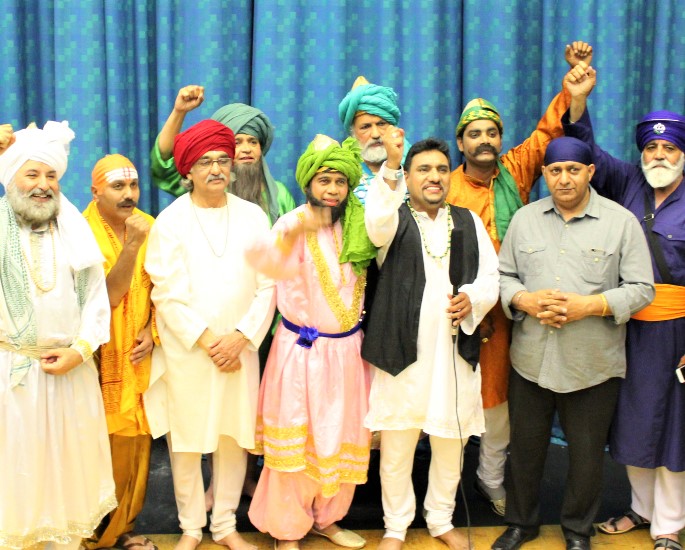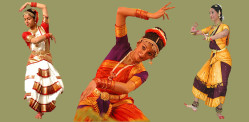"Everyone is welcomed to be a part of the entertainment."
The Punjabi Theatre Academy is an artistic organisation that promotes the Punjabi culture to the next generation of budding actors and actresses.
Founder, Tajinder Sindra (Mr TP Singh), has been evolving the academy for the past 30 years which focuses on the roots and heritage of Punjabi culture.
As an established writer, actor and director, Tajinder’s catalogue of experience is truly impressive.
Having acted and directed in Bollywood films such as London 2 Amritsar and London De Heer, Tajinder has solidified himself within the industry.
Now, this abundance of experience has been utilised within the academy, by offering participants unique training within acting, dancing, writing and directing.
By honing in on specific practices and methods, the academy has exposed participants to an array of skilled professionals.
Excitingly, the academy is now expanding into Bollywood by opening a Punjabi Theatre and Film Academy.
This gateway of opportunity will provide exclusive workshops and networking for young artists pursuing a career in Bollywood.
Not only will this enhance the reputation of the arts among the South Asian community, but also expose the talent hidden within British Asians.
DESIblitz spoke exclusively with the Punjabi Theatre Academy about Tajinder’s career and plans for the future.
What led you to create the Punjabi Theatre Academy?
When Mr TP Singh arrived in England in 1985 he noticed the only thing in the Punjabi community made for entertainment was Bhangra beats and singing groups aimed towards the youngsters.
However, nothing was available for the elderly who had migrated from Punjab to make a living in England.
Unfortunately, they never got the chance to go back home so he took the opportunity and established a theatre group in collaboration with Channi Singh called Alaap group.
His first production as a director and as the main lead was in a play called Eclipse of the Sun (Suraj Dah Grahain) in 1986 at Paul Robeson Theatre, Hounslow, London.
How is the academy different to others?
Unlike other organisations, Punjabi Theatre Academy is the only platform in London that connects the South Asian community to its roots through various art forms such as dance and acting for theatre.
The academy allows young people to share their creative ideas in workshops which results in producing a theatre production or a film.
We offer training and opportunities to grow.
In addition to this, we have worked with many local dignified figures such as MPs and GPs who have approved of the work we have done in the past such as poetry contests and historical plays.
Furthermore, we provide artists with a chance to be involved in Bollywood knowing how difficult it can be to succeed in an industry overseas.
The focus of the academy is to get families involved in heritage relevant activities.
Whether this includes young people or the elderly, everyone is welcomed to be a part of the entertainment.
What does the academy hope to achieve with its participants?
For every participant, we will aim to build their confidence and encourage them to follow their passion.
Developing their skills is absolutely vital for a competitive industry.
Therefore, they will be able to attend workshops and training sessions to be the best at their craft whether it is dancing, singing, acting or writing.
They can also build a long term networking base to the industry and find the right opportunities for film and theatre across Bollywood and theatres in the UK.
How has the academy developed actors?
The academy has cast different ages for a variety of stage plays.
In the process of constructing the productions, acting workshops and training have been provided to develop skills and understanding of the text.
As a lot of historical plays have been showcased, it has been important for the actors to understand the text and context of the script.
This is a vital development period for actors as they can transfer these skills onto other projects.
Learning and understanding text is the first thing an actor should be confident with; it prepares them for the character after the information is absorbed.
How will the Punjabi Theatre Academy expand into Bollywood?
Mr TP Singh who is the executive director has built solid connections in the last 30 years of his work crossing over into Bollywood.
Now, Punjabi Theatre Academy will be changing to Punjabi Theatre and Film Academy. Therefore, the focus will be an even balance of film and theatre.
This will be an opportunity to utilise Mr TP Singh’s connections and networking system to expand into the Bollywood film industry.
Punjabi Theatre Academy was theatre focused but after the pandemic, we wish to grow and bring a new flavour and side to the organisation.
As we expand into Bollywood, there will be more opportunities for young South Asian artists to work in a film produced in Punjabi and Hindi.
These language skills are important and we can train participants with their dialogue delivery so they are prepared for the big world of Bollywood.
How have Desi women influenced the Punjabi Theatre Academy?
Gender inequality is recognised by Punjabi Theatre Academy which is why in the play, Puwara Bottle Dah, the mistreatment of women is covered.
By taking the element of feminism, the production includes a woman speaking up to her drunkard husband after he abuses her.
We acknowledge how Desi women are treated and we use our power to make the change.
Their experiences influence our work; it is important to be vocal about abuse and inequality against women.
Women’s voice is taken into consideration at the academy. The staff and volunteers at Punjabi Theatre Academy are mostly female-identifying individuals.
Will the Punjabi Theatre Academy consider Hollywood?
Hollywood is an industry that lacks representation for the South Asian artists hence why it is an industry that will be considered to work with.
The training that is offered for performing can be utilised in Hollywood too, the skills are not limited, they are transferrable.
The key element of being a performer is confidence, which is used in theatres and film across the world.
After the participants complete their training sessions, they can apply their knowledge to the industry of their choice.
Why do you have a historical focus in your plays?
People who were born and raised in England and studied in the country are not taught historical events that took place in India or in relation to their South Asian roots.
Our main focus is on the history of Punjab which can only be learned through elders.
However, we have made successful attempts to change that through the arts. For example, we have theatre productions dedicated to Maharaja Ranjit Singh, Guru Nanak Dev Ji and Bhagat Singh.
They are very significant figures for Indian history which we are very proud of teaching, especially when schools in England do not focus on educating these important historic figures.
It is very important to have a historical focus for the academy as it is a very educational yet entertaining way to teach the youth about their background.
This is a piece of vital history that is a huge part of the people we are today therefore it important to make sure history is not forgotten.
What does film offer that plays do not?
Films offer inclusivity, it is accessible to people across the world whereas theatre has its limitations on its audience.
Watching films means you could always watch them when you desire and you have the option to pause, rewind and fast forward.
In terms of performing, films are shot in various frames and sequences.
The process is very different to theatre as there is an option to stop and start again. However, in theatre once a mistake is made it is important to carry on, in other words, the show must go on.
Filming requires patience as there are a lot of takes. Also, there are multiple angles filmed in just one scene, meaning the audience gets to see different sides.
In a theatre, as an audience, you will only get to see one aspect of the performance which depends on where you are standing or sitting.
How can South Asian representation be better in film?
The Hollywood industry does not have enough actors to represent the South Asian community.
Therefore, this platform is needed to accommodate artists that will welcome artists with a South Asian heritage to then be encouraged to pursue a career in the entertainment industry.
Hollywood has been ignorant in portraying Asian characters in a stereotypical manner. For example science geeks, computer nerds, the “tech guy”, and the ones with stricter parents.
The area which needs improving is showing everyday South Asians who like the arts, who like sports and the ones who don’t enjoy education.
Not all South Asians are intellectual in the sense of education. The portrayal of personality for a South Asian character in films is missing.
More South Asian artists are required in Hollywood and they need to be less stereotyped so the industry can be more relatable.
What difficulties have you faced as a Desi writer and actor?
In the last 30 years of Mr TP Singh’s experience as a writer and actor, there were a few difficulties he felt he faced as he did not adopt Western theatre.
His passion and creative skills have always been working on the Punjabi language, values of Punjabi culture, historical roots, and he contributes his pen to produce a Sikh historical venture.
He feels proud that he lives in a Punjabi theatre environment in Great Britain and the audience has liked his talent and recognised his work.
On the other hand, the majority of British Punjabi writers, actors and directors have forgotten their roots and only have their vision and goal setting for the young society.
The elder audiences have been isolated and left alone due to these created circumstances, leading them to live the rest of their lives sitting at home and watching TV alone.
As a Punjabi language director, writer, and actor; practically, he did not feel any difficulties in regards to his talents in producing a Punjabi production written and directed by himself.
One of the productions, Bebe Vilayat Wich ( Mother-In-Law in London) became very popular amongst the Punjabi community and showcased 25 shows around the UK in 1995-96.
In Southall, Sanjeev Baskar and Sandeep Sharma from the West End saw his production and they offered to do a joint venture like this in the near future.
However, he missed this opportunity which he deeply regrets as it was a golden opportunity.
What would you say to budding South Asian actors/actresses?
Punjabi Theatre Academy strongly suggests that the new up and coming South Asian actors are confident in their craft and continue to pursue their respective careers.
The most important thing, it is never too late to pick up a new skill or hobby that will enhance your work in this industry.
For example, dancing, which can be learned at any time as well as writing.
Furthermore, even if the confidence is not there yet do not give up. Confidence takes time and patience.
Punjabi Theatre Academy is a great platform to start as we offer confidence-building activities and workshops which will increase self-esteem and develop skills.
With intriguing training styles and motivated professionals, the academy has created a family-like environment.
This togetherness and solidarity within the organisation is a recipe that Tajinder believes will bring success.
Tajinder’s determination to teach the younger generation about Punjabi culture through theatre and film is innovative and inspiring.
Not only does this help young artists to refine their skills, but provides them with a heap of knowledge that they may not be exposed to.
This is vital and impressive, considering the academy covers topics such as child abuse, alcohol misuse and the mistreatment of women in society.
As the Punjabi Theatre Academy expands, it will allow for a bigger platform for South Asian creatives to pursue their acting careers.
With free taster sessions and engaging workshops, the Punjabi Theatre Academy is gearing up to take over the industry.
Keep updated on the academy’s current projects and upcoming activities here.



















































